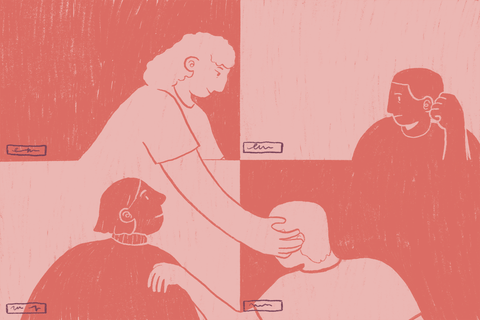Loneliness is nothing new.
Even before the pandemic, we all probably had times of feeling isolated from others.
We might’ve struggled to find ways to meet our needs for communication, intimacy, and companionship; or we may have been in a relationship but felt as though the other person didn’t see or hear us properly.
Since the spread of coronavirus and the introduction of lockdowns, loneliness has only increased.
One in two Australians report feeling more lonely now than they did prior to coronavirus, and although many of us are staying apart for good reason—to prevent others from potentially getting sick—the effects of social distancing feel more real than ever.
Today we’re going to talk about loneliness: how it feels and how we can overcome it.
We’re not going to give you any chirpy one-liners about ‘cheering up’ and ‘looking on the bright side’—we’ve got some information and suggestions that are practical, actionable, and hopefully helpful.
Who feels lonely during the pandemic?
Research conducted by Harvard University suggests that those hit hardest by feelings of loneliness during the pandemic are teens and young adults.
This makes sense to us—although older people certainly aren’t immune to feelings of loneliness, younger people might still be developing their social networks so might have fewer ‘permanent’ social or familial contacts than older people.
No matter our age, we’re all pretty social creatures. We’ve gone from chatting with our neighbours, catching up with our favourite barista, making small talk with the Uber driver, and having watercooler conversations with our colleagues to...basically nothing.
For many of us, the few conversations we now have are conducted through Zoom or text messaging, and those familiar markers of friendship like hugs and high fives have all but vanished.
Many Australian states and territories do allow for romantic partners or ‘single bubble buddies’ to visit, but there are many reasons why you might not choose to have visitors over right now.
Not everyone has a romantic partner or close friend to invite over.
We’re not all vaccinated yet, and even those who are vaccinated may have very good reasons to limit their contact with others. (It can also just feel really scary to see people again, even once restrictions are lifted!)
So the increase in loneliness is no surprise.
How to tackle loneliness
Although many of us might start to feel substantially better when we can see our families and friends again, at the time of writing this many Australian states are still under lockdown orders and seeing other people isn’t possible.
Here are some things you may be able to do in the meantime to combat loneliness and reach out to those around you, even only virtually.
Ask for help.
We know everyone’s saying it right now, but it’s for a good reason: if you’re struggling with loneliness, depression, anxiety, or even just feeling blue, please reach out and ask for help.
It’s true that there is an increased demand for mental health services at the moment, but Australia’s health professionals remain among the best in the world and they want to help you.
You can schedule a telehealth appointment with your GP and ask for a mental health care plan, which will start you on the right path to speaking with a professional.
This can be done from home, and if you see a professional who bulk-bills you’ll be able to claim it on Medicare.
Your workplace, school, or local community group might also be able to direct you towards counselling services, and crisis services like Lifeline are available 24 hours a day if you need urgent help.
We also like Friendline, which is not a crisis service but does let you have a nice chat with a friendly volunteer!
Offer help.
Hear us out on this, because we know that if you’re feeling down sometimes it can be the hardest thing in the world to help yourself, let alone someone else.
But sometimes doing something kind for another person can make a world of difference: it gives you a project to work on, provides a sense of purpose for the day, and gives you that all-important endorphin boost that comes from having done something good.
You don’t necessarily need to go out and volunteer with a charity to participate in some random acts of kindness.
Could you call an elderly neighbour and ask if they need some groceries delivered? Do you live near an essential worker who’d really appreciate having their dog walked once a week?
Maybe you’ve got some flowers or herbs in your garden you could cut and leave outside for people to take? Or perhaps you’d be interested in becoming a penpal for someone else experiencing loneliness?
Sometimes, when we’re feeling alone, an act of kindness can make a world of difference for ourselves and others.
Set up a routine.
Okay, so we’re not about to suggest you get up at 6am every morning for a run and a kale smoothie—unless that’s your thing!
But choosing a routine can add structure and purpose to your day, especially during lockdown when so many of our days feel like they follow the ‘wake up, watch press conference, and doom scroll until dinner’ formula.
You might want to start by giving yourself a regular bedtime (our sleeping patterns can really affect our moods and emotional states), making time for a walk or some light exercise, and having a regular ‘social occasion’, even if it’s just a phone call to your mum or pizza night with your housemate.
Pick up a new hobby or interest.
Remember when you said you’d love to get into cross-stitch, if you only had the time?
The good (and bad) news is that now we seem to have all the time in the world. Even in lockdown, hobbies can be social pursuits: book clubs are flourishing, online escape rooms are taking off, and groups like Laneway Learning are offering short classes in everything from budgeting to making macrame wall hangers.
And if you’ve always wanted to learn that language, now might be the time. Apps like Duolingo and Memrise can be used for free, and an online language meet-up can help you practise your new skills while meeting others with the same interest.
If you want a longer-term commitment, Open Universities facilitates online higher education—when you enrol in your course or degree you’ll have classmates and teachers to speak with as you study.
Take advantage of the freedoms you have.
We’re all probably hanging out for that first brunch date or pub visit, but until then we do have limited options for social interactions.
Depending on your local state or territory’s lockdown restrictions and your own level of comfort, you might be able to meet others for exercise or even catch up for a picnic.
If nobody has gotten in touch yet to invite you to their park lunch, why not organise one yourself?
Message a few people you know from the local area—your neighbour down the road, your old co-worker, that person you went to uni with.
It might feel like a rag-tag group of mates, but there’s every chance that these people are sitting at home waiting for someone to ask them out.
Make the first move and spend a day or two planning the perfect outing: your new mates will thank you for it.
To learn more about the foundations of great sex with acclaimed sex coach Georgia Grace, check out NORMAL's video masterclass, The Modern Guide To Sex.







